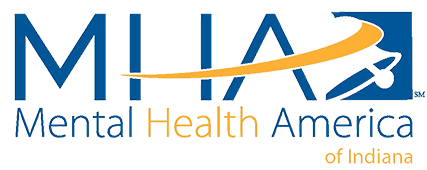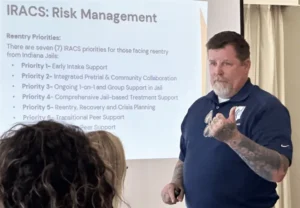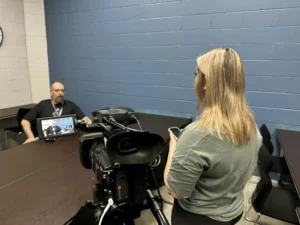Inmates with mental health and substance use disorders in five Indiana counties will be offered new peer support and resources through a pilot program designed to connect them with treatment options, the Indiana Family and Social Services Administration’s Division of Mental Health and Addiction has announced.
The Integrated Reentry and Correctional Support program, or IRACS, which was announced Thursday, is designed to engage incarcerated individuals in Blackford, Daviess, Dearborn, Delaware and Scott counties with mental health and substance use disorders with certified peer professionals and wraparound services.
“The first three steps an individual takes upon exiting the justice system are often the most important steps they will take in their recovery journey,” Douglas Huntsinger, executive director for drug prevention, treatment and enforcement for the state of Indiana, said in a news release. “Regardless of how an individual ended up in the justice system, how they move forward matters. By providing access to peers and wraparound services while individuals are incarcerated, we intend to reduce recidivism and future involvement in the justice system.”
According to the FSSA, the pilot program provides peer-driven, Sequential Intercept Model, or SIM, support for inmates with mental health and substance use disorders.
Inmates booked at each of the five county jails participating in the pilot program will be evaluated as potential IRACS support clients, resulting in treatment and formal support for identified clients.
Each pilot site received a grant of up to $500,000 to build their teams and infrastructure, funded through June 2023 by Recovery Works. The money is geared toward helping develop and support a full-spectrum reentry process that collaborates with community partners outside of the jail to ensure continuity in care upon release.
Forensic peer teams stationed at each jail consist of a certified program supervisor, certified peer support, resource peer navigator, reentry peer and peer engagement coordinator, all employed by the Indiana Recovery Network’s regional recovery hubs.
Those teams work within the jail settings and collaborate with correctional, pretrial and nursing staff and all community providers to support incarcerated individuals during their time in the program.
Jail staff will also receive special training to support IRACS personnel and incarcerated individuals, the FSSA said.
Peers will walk alongside each identified incarcerated individual using the IRACS Recovery Engagement Pathways and provide relevant responsive support and resources. The pathways are reentry-focused and can change as an individual’s legal process develops and sentencing is established.
Data gathered at the close of the program will be reported by sheriffs in each county to the FSSA for evaluation. If the results show success, the state says it is “committed to expanding the IRACS program to more Indiana county jails within the next three years.”
Indiana Forensic Services and the Indiana Recovery Network, DMHA and programs of Mental Health America of Indiana collaborated on the pilot.




